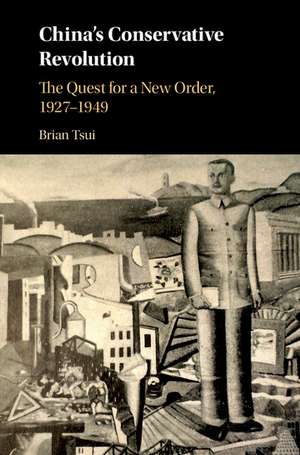China's Conservative Revolution: The Quest for a New Order, 1927–1949
Autor Brian Tsuien Limba Engleză Hardback – 18 apr 2018
| Toate formatele și edițiile | Preț | Express |
|---|---|---|
| Paperback (1) | 285.93 lei 6-8 săpt. | |
| Cambridge University Press – 27 noi 2019 | 285.93 lei 6-8 săpt. | |
| Hardback (1) | 695.26 lei 6-8 săpt. | |
| Cambridge University Press – 18 apr 2018 | 695.26 lei 6-8 săpt. |
Preț: 695.26 lei
Preț vechi: 781.19 lei
-11% Nou
Puncte Express: 1043
Preț estimativ în valută:
133.04€ • 139.25$ • 110.73£
133.04€ • 139.25$ • 110.73£
Carte tipărită la comandă
Livrare economică 31 martie-14 aprilie
Preluare comenzi: 021 569.72.76
Specificații
ISBN-13: 9781107196230
ISBN-10: 110719623X
Pagini: 304
Dimensiuni: 157 x 235 x 20 mm
Greutate: 0.55 kg
Editura: Cambridge University Press
Colecția Cambridge University Press
Locul publicării:New York, United States
ISBN-10: 110719623X
Pagini: 304
Dimensiuni: 157 x 235 x 20 mm
Greutate: 0.55 kg
Editura: Cambridge University Press
Colecția Cambridge University Press
Locul publicării:New York, United States
Cuprins
1. Introduction; 2. Orthodoxy: purifying the revolution; 3. The masses: a youth movement for the conservative revolution; 4. State comes first: wartime spiritual revolution; 5. Convergence: liberal sentimentalities and the conservative revolution; 6. World revolution: China, Pan-Asianism and India.
Recenzii
'In this incisive volume, Tsui conclusively demonstrates that the Nationalists' quest for 'capitalism without capitalism' - or fascism - was the central feature of the ideology and organization of the politics of conservatism in China's Republican period. This study is a meticulous work of history; it is also indispensable for our contemporary moment.' Rebecca E. Karl, New York University
'In this study of the 1930s, Brian Tsui reshapes our understanding of the radicalization of Chinese politics and culture. He situates China's 'conservative revolution' in the context of global history, showing how the Nationalists valorized the nation in a language of fascist modernity while forging bonds with anticolonial movements across Asia. If the conservative revolution failed in its own incoherent terms, it nonetheless left permanent marks.' Peter Zarrow, University of Connecticut
'As intellectual biography, Tsui brings to life Dai Jitao, Chen Lifu, Zhu Guangqian, Tan Yunshan, Fu Sinian, Jiang Dingfu, Li Shizeng and Pan Gongzhan as architects of the conservative revolution. … Tsui has written a deeply researched and highly original re-interpretation of political thought during the Chiang Kai-shek era.' Stephen R. Mackinnon, The China Quarterly
'In his book, Brian Tsui expands discussion of nationalism and aesthetics at the core of the conservative revolution, moving from the United Front into the wartime period.' Jeremy Tai, Modern Chinese Literature and Culture
'Brian Tsui's outstanding new book is a welcome piece of scholarship that takes scholars back to the legacy of 1927 … Understanding China's mid-twentieth century revolution in these terms gives Tsui's book a startling freshness. Its contemporary relevance is just one element of its quality; in the depths of its research and complexity and seriousness of its historical insights, it is a deeply significant work.' Rana Mitter, Journal of Chinese Studies
'The book's thoroughly theoretical discussion is a brilliant and inspiring read for those who are interested in modern intellectual currents and political ethics.' Jing Zhang, Twentieth-Century China
'… [Tsui's] subtle treatment of the 'conservative revolution' in theory and practice reveals a fascinating set of connections between Confucian order, mass politics and global change.' Tehyun Ma, The English Historical Review
'The book will be the authoritative work on this for a long time to come.' Edmund S. K. Fung, The China Journal
'In this study of the 1930s, Brian Tsui reshapes our understanding of the radicalization of Chinese politics and culture. He situates China's 'conservative revolution' in the context of global history, showing how the Nationalists valorized the nation in a language of fascist modernity while forging bonds with anticolonial movements across Asia. If the conservative revolution failed in its own incoherent terms, it nonetheless left permanent marks.' Peter Zarrow, University of Connecticut
'As intellectual biography, Tsui brings to life Dai Jitao, Chen Lifu, Zhu Guangqian, Tan Yunshan, Fu Sinian, Jiang Dingfu, Li Shizeng and Pan Gongzhan as architects of the conservative revolution. … Tsui has written a deeply researched and highly original re-interpretation of political thought during the Chiang Kai-shek era.' Stephen R. Mackinnon, The China Quarterly
'In his book, Brian Tsui expands discussion of nationalism and aesthetics at the core of the conservative revolution, moving from the United Front into the wartime period.' Jeremy Tai, Modern Chinese Literature and Culture
'Brian Tsui's outstanding new book is a welcome piece of scholarship that takes scholars back to the legacy of 1927 … Understanding China's mid-twentieth century revolution in these terms gives Tsui's book a startling freshness. Its contemporary relevance is just one element of its quality; in the depths of its research and complexity and seriousness of its historical insights, it is a deeply significant work.' Rana Mitter, Journal of Chinese Studies
'The book's thoroughly theoretical discussion is a brilliant and inspiring read for those who are interested in modern intellectual currents and political ethics.' Jing Zhang, Twentieth-Century China
'… [Tsui's] subtle treatment of the 'conservative revolution' in theory and practice reveals a fascinating set of connections between Confucian order, mass politics and global change.' Tehyun Ma, The English Historical Review
'The book will be the authoritative work on this for a long time to come.' Edmund S. K. Fung, The China Journal
Notă biografică
Descriere
Tsui reveals the peculiarities of the Guomindang's revolutionary enterprise, resituating Nationalist China in the moment of global radical right ascendancy.
